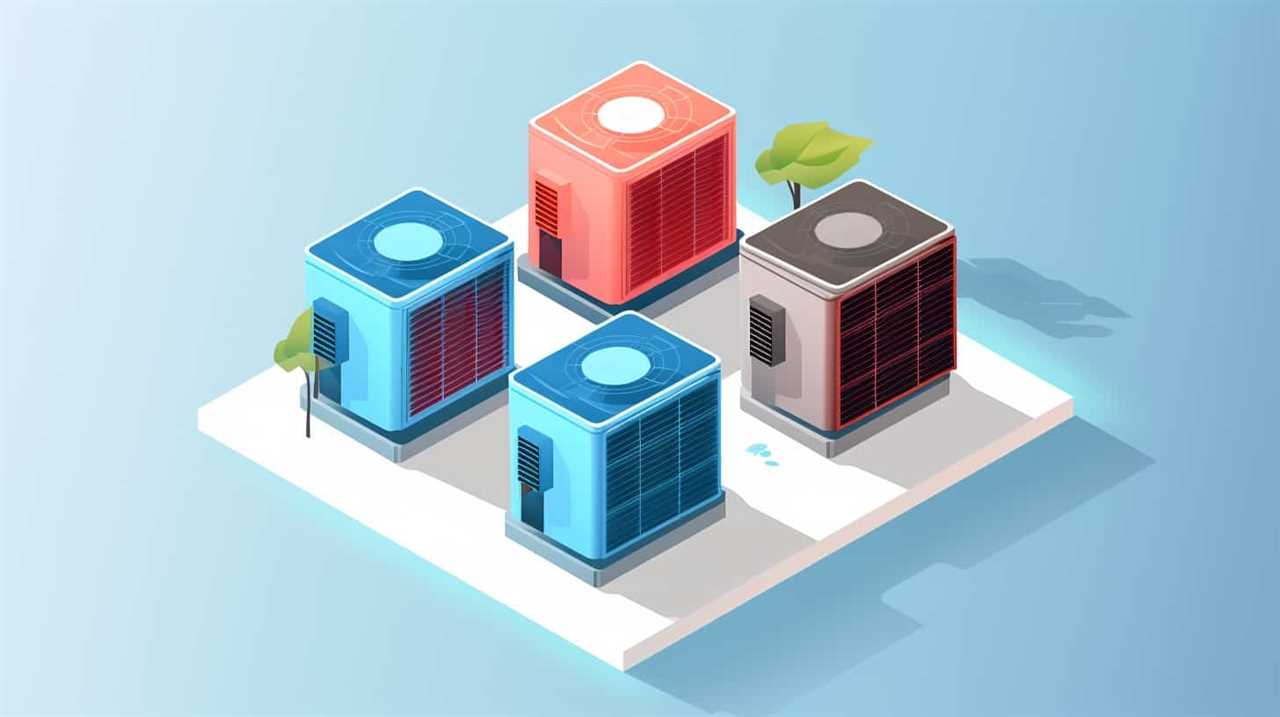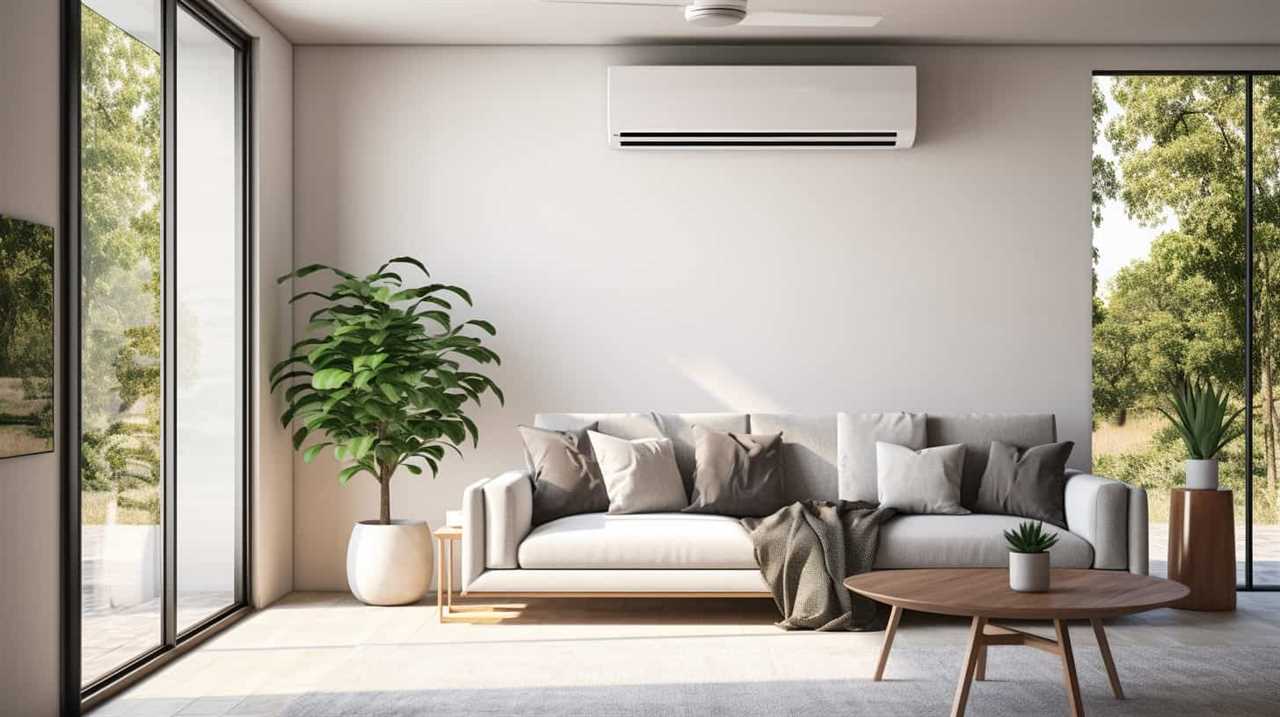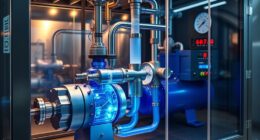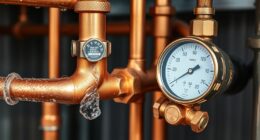We have discovered information regarding the energy efficiency of heat pumps, and we are thrilled to share our research with you.
In this article, we’ll delve into the seven key factors you need to understand to make informed decisions about your heat pump’s efficiency.
From the importance of Energy Star ratings to the factors that affect efficiency, we’ll provide you with the technical knowledge you need.
Get ready to maximize your heat pump’s performance and save energy.

Let’s dive in together.
Key Takeaways
- Energy efficiency ratings, such as SEER and HSPF, measure the energy consumption and efficiency of heat pumps.
- Higher energy efficiency ratings indicate more energy-efficient heat pumps, resulting in cost savings on energy bills and reduced environmental impact.
- The Energy Star program identifies and promotes energy-efficient heat pumps that meet strict energy efficiency guidelines.
- Factors such as compressor type, coil design, refrigerant choice, insulation, ductwork, and proper maintenance all impact the energy efficiency and performance of heat pumps.
Understanding Energy Efficiency Ratings
Let’s delve into the intricacies of energy efficiency ratings. Understanding energy efficiency ratings is crucial when it comes to making informed decisions about heat pumps. These ratings provide valuable information about the energy efficiency benefits and cost savings potential of different models.
Energy efficiency ratings measure the amount of energy a heat pump consumes compared to the amount of heat it generates. Higher ratings indicate a more energy-efficient heat pump, which can lead to significant cost savings on energy bills. By choosing a heat pump with a high energy efficiency rating, homeowners can reduce their energy consumption and lower their environmental impact.
Now that we understand the importance of energy efficiency ratings, let’s explore the significance of Energy Star ratings for heat pumps.

Importance of Energy Star Ratings for Heat Pumps
One of the most important factors to consider when evaluating heat pump efficiency is the Energy Star rating.
The Energy Star program is a voluntary labeling program developed by the U.S. Environmental Protection Agency (EPA) and the Department of Energy (DOE) to identify and promote energy-efficient products.
Heat pumps with an Energy Star rating meet strict energy efficiency guidelines set by these organizations.
Choosing an Energy Star-rated heat pump ensures that you’re investing in a high-quality and energy-efficient system.

The energy efficiency benefits of an Energy Star-rated heat pump are significant.
These heat pumps are designed to use less energy, which not only reduces your carbon footprint but also leads to significant cost savings.
SEER Rating: What It Means for Energy Efficiency
SEER rating, or Seasonal Energy Efficiency Ratio, is a crucial factor in determining the energy efficiency of a heat pump. It measures the cooling output of the heat pump during a typical cooling season divided by the energy consumed. The higher the SEER rating, the more energy efficient the heat pump, as it indicates that the unit is able to provide more cooling output while using less energy.
Several factors can affect the SEER rating of a heat pump. These factors include the type of compressor, coil design, and refrigerant used. Each of these components plays a role in how efficiently the heat pump operates. For example, a heat pump with a variable-speed compressor may have a higher SEER rating because it can adjust its speed based on the cooling needs of the space. Similarly, a heat pump with an advanced coil design may provide better heat transfer, resulting in higher efficiency.
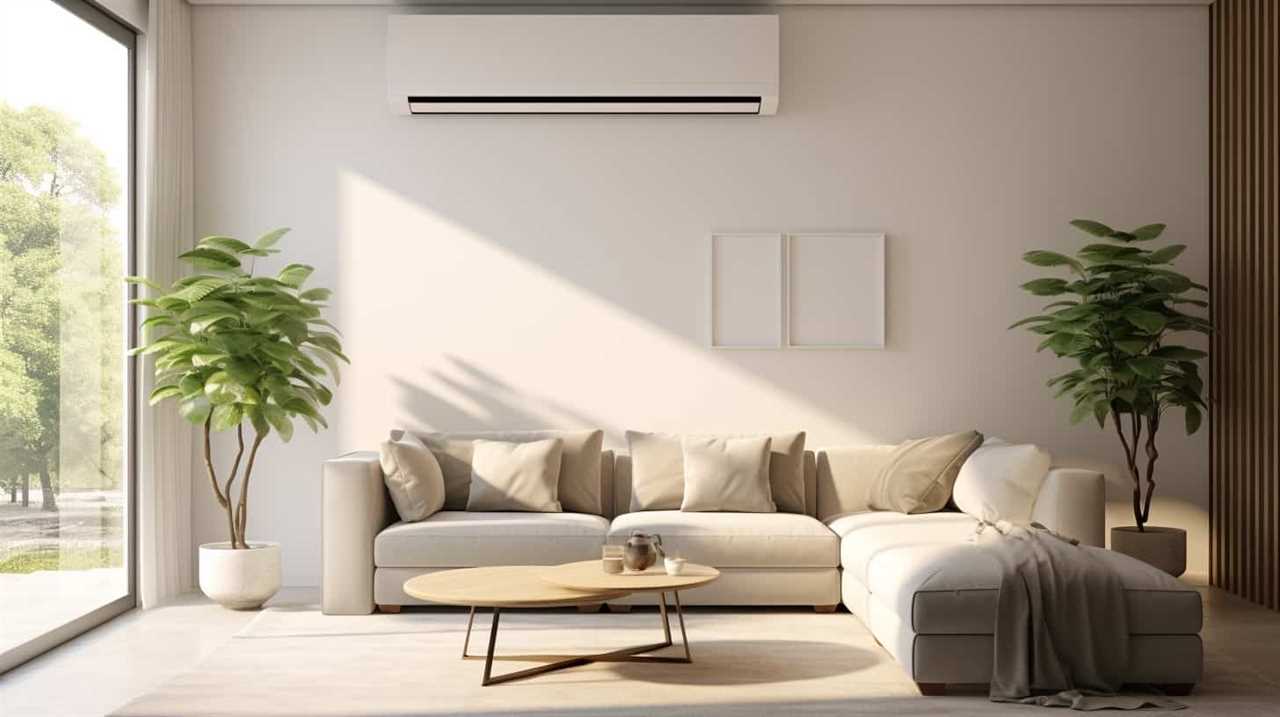
The choice of refrigerant also impacts the SEER rating. Some refrigerants, such as R-410A, are more environmentally friendly and have better thermal properties, allowing for higher efficiency. Other refrigerants, like R-22, are being phased out due to their negative impact on the ozone layer and lower energy efficiency.
Importance of SEER Ratings
When considering the energy efficiency of a heat pump, it’s important to understand the significance of SEER ratings. SEER, or Seasonal Energy Efficiency Ratio, is a measure of the cooling efficiency of a heat pump. It indicates the amount of cooling output a heat pump provides for each unit of energy it consumes. A higher SEER rating means a more efficient heat pump, resulting in lower energy consumption and reduced utility bills.
The benefits of high SEER ratings are numerous. Firstly, a high SEER-rated heat pump can significantly decrease heat pump energy consumption compared to a lower-rated model. This not only saves money but also reduces the environmental impact of energy usage. Secondly, high SEER ratings often come with advanced features such as variable-speed compressors and smart thermostats, which further enhance energy efficiency and provide more precise temperature control.
Understanding SEER ratings is crucial when choosing a heat pump, as it directly affects the energy efficiency and cost-effectiveness of the system. By opting for a heat pump with a high SEER rating, homeowners can enjoy lower energy bills, increased comfort, and a reduced carbon footprint.

Factors Affecting SEER Ratings
To determine the factors that impact SEER ratings, we need to assess the efficiency of the heat pump’s components and their ability to effectively cool the air. Here are some key factors that affect SEER ratings:
-
Factors affecting COP: The Coefficient of Performance (COP) is a measure of how efficiently a heat pump operates. Higher COP values indicate better energy efficiency. Factors such as insulation, ductwork, and system maintenance can affect the COP of a heat pump.
-
Benefits of variable speed technology: Heat pumps with variable speed technology can adjust their speed to match the heating or cooling demands of a space. This allows for more precise temperature control, reduced energy consumption, and improved comfort.
-
Proper sizing and installation: A heat pump that isn’t properly sized or installed can lead to reduced efficiency and performance. It’s important to consider factors such as the size of the space, insulation levels, and climate conditions when sizing and installing a heat pump.

-
Regular maintenance and servicing: Regular maintenance and servicing of the heat pump can help optimize its efficiency and performance. This includes cleaning or replacing filters, checking refrigerant levels, and ensuring proper airflow.
Understanding these factors and their impact on SEER ratings can help homeowners make informed decisions when choosing a heat pump and maximizing its energy efficiency.
HSPF Rating: A Key Factor in Heat Pump Efficiency
When it comes to heat pump efficiency, the HSPF rating plays a crucial role.
The HSPF, or Heating Seasonal Performance Factor, measures the heating efficiency of a heat pump system over an entire heating season.
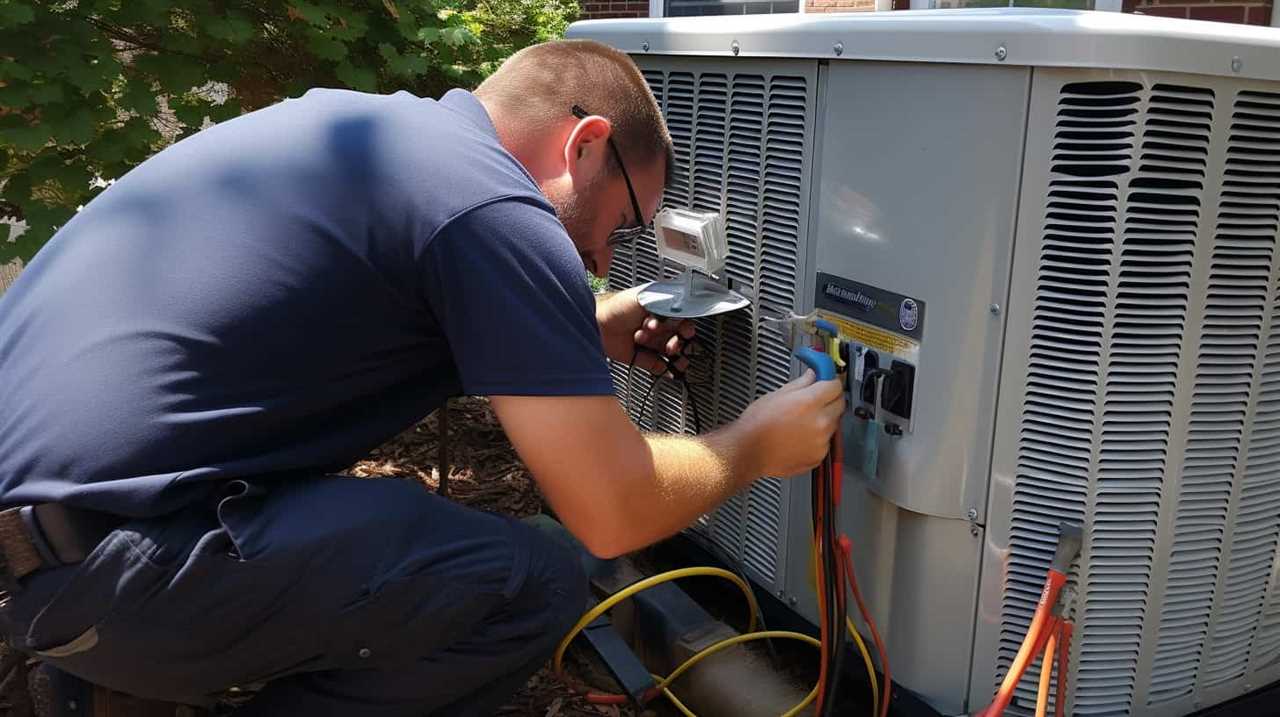
It’s an important metric to consider because it takes into account factors such as the heat pump’s energy consumption, the outdoor temperature, and the heating capacity.
Importance of HSPF
The HSPF rating is a crucial factor in determining the efficiency of a heat pump. Understanding the importance of HSPF can help homeowners make informed decisions about their heating systems. Here are some key points to consider:
- The HSPF rating measures the heating efficiency of a heat pump over an entire heating season.
- A higher HSPF rating indicates better energy efficiency and lower operating costs.
- The HSPF rating takes into account the heat output of the heat pump divided by the electrical energy input, similar to the coefficient of performance (COP).
- Heat pump zoning, which allows for different temperature settings in different areas of the home, can further enhance the energy efficiency and comfort provided by a heat pump.
By considering the HSPF rating and implementing heat pump zoning, homeowners can maximize the efficiency and comfort of their heating system.
Now, let’s explore the comparison between HSPF and SEER ratings in the next section.

HSPF Vs SEER
Let’s compare the HSPF and SEER ratings to understand the key factor of HSPF in heat pump efficiency. HSPF stands for Heating Seasonal Performance Factor, while SEER stands for Seasonal Energy Efficiency Ratio. Both ratings are used to measure the efficiency of heat pumps, but they focus on different aspects.
HSPF measures the heating efficiency of a heat pump over an entire heating season. It takes into account the heat output compared to the electricity consumed. The higher the HSPF rating, the more efficient the heat pump is.
On the other hand, SEER measures the cooling efficiency of a heat pump. It calculates the cooling output compared to the electricity consumed. A higher SEER rating indicates a more efficient cooling performance.
When comparing HSPF and SEER, it’s important to note that HSPF is a better indicator of overall energy savings because it takes into account both heating and cooling efficiency. The COP (Coefficient of Performance) is another metric that can be used to evaluate heat pump efficiency, but it only considers the heating performance.
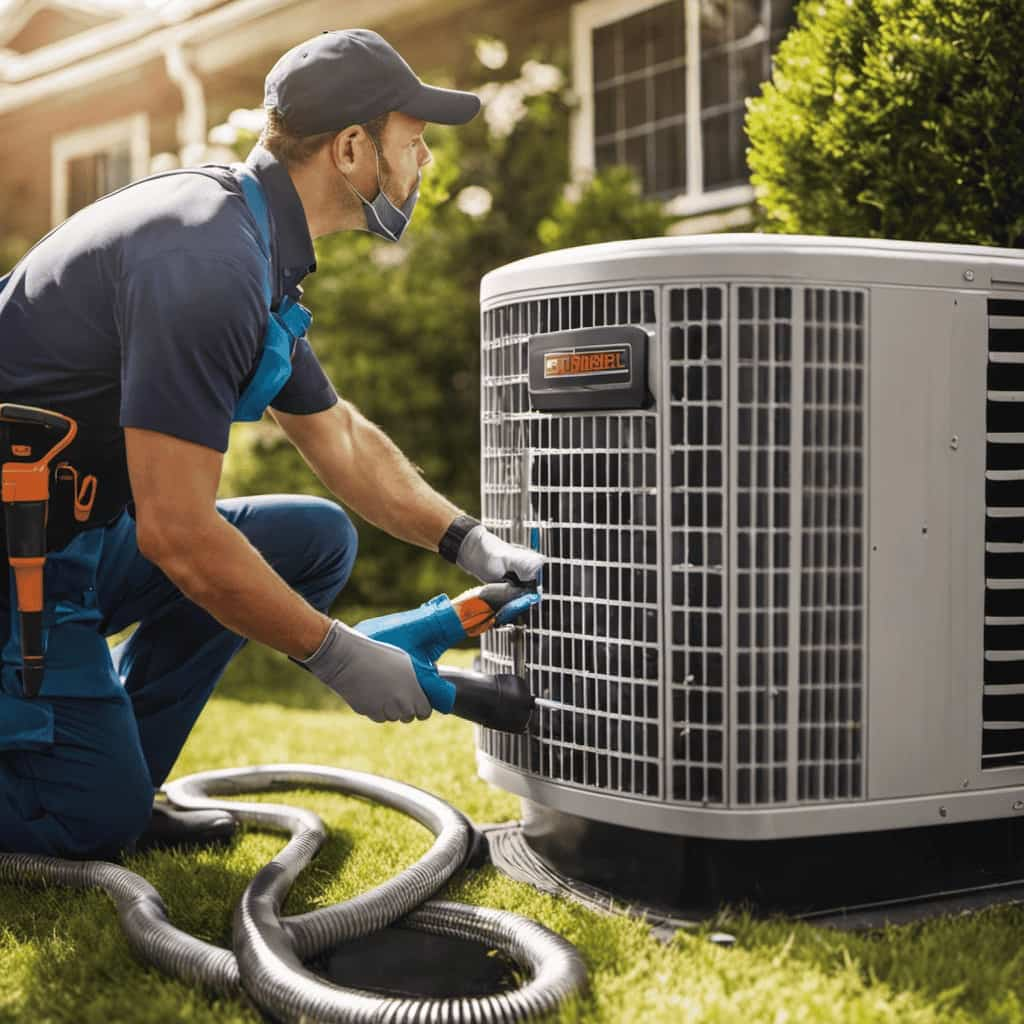
To calculate energy savings, you can multiply the HSPF rating by the electricity cost per unit to estimate the annual heating cost. Similarly, multiplying the SEER rating by the electricity cost per unit can give you an estimate of the annual cooling cost.
Factors Affecting HSPF
We need to understand the factors that affect HSPF in order to grasp its role as a key factor in heat pump efficiency. Here are some factors that can affect the HSPF rating:
-
Climate: The HSPF of a heat pump can vary depending on the climate it operates in. Heat pumps perform better in milder climates compared to colder regions.
-
System size and design: The size and design of the heat pump system can impact its efficiency. Proper sizing and design are essential for optimal performance.

-
Insulation and air leakage: Good insulation and minimal air leakage in the house can help improve the heat pump’s efficiency by reducing energy losses.
-
Regular maintenance: Regular maintenance, including cleaning filters and checking refrigerant levels, can ensure that the heat pump operates at its peak efficiency.
Understanding these factors can help homeowners make informed decisions when choosing a heat pump and implementing energy-saving tips.
Now, let’s delve into the factors that affect overall heat pump efficiency.

Factors Affecting Heat Pump Efficiency
When considering heat pump efficiency, it’s important to understand the factors that can affect its performance.
Two key factors that play a significant role in heat pump efficiency are heat pump maintenance and heat pump size.
Proper maintenance of the heat pump ensures that it operates at its optimal level, maximizing its efficiency. Regular cleaning and inspection of the filters, coils, and fans can prevent any blockages or malfunctions that may hinder the heat pump’s performance.
Additionally, having the right size heat pump is crucial for achieving maximum efficiency. A heat pump that’s too small may struggle to adequately heat or cool a space, while a heat pump that’s too large may cycle on and off frequently, leading to energy waste.

In the next section, we’ll delve into the importance of choosing the right size heat pump for maximum efficiency.
Choosing the Right Size Heat Pump for Maximum Efficiency
How can we ensure maximum efficiency when choosing the right size heat pump?
Choosing the right size heat pump is crucial for maximizing energy efficiency. Here are some sizing considerations that can help you make an informed decision:
-
Calculate the heating and cooling load of your space: This involves assessing factors such as insulation, square footage, number of windows, and climate conditions.

-
Consult with a professional: An HVAC specialist can perform a detailed analysis to determine the appropriate size based on your specific needs and requirements.
-
Avoid oversized or undersized units: Oversized units may cycle on and off frequently, leading to energy waste, while undersized units may struggle to meet the desired heating or cooling demands.
-
Consider the SEER and HSPF ratings: Higher Seasonal Energy Efficiency Ratio (SEER) and Heating Seasonal Performance Factor (HSPF) ratings indicate better energy efficiency.
By taking these sizing considerations into account, you can reap the efficiency benefits of a properly sized heat pump.

Now, let’s explore how to maximize energy efficiency with heat pump maintenance.
Maximizing Energy Efficiency With Heat Pump Maintenance
By regularly cleaning and inspecting the heat pump, we can ensure optimal energy efficiency and performance. Proper heat pump maintenance is essential to maximize energy savings and prolong the lifespan of the equipment. Here are some heat pump maintenance tips and energy-saving strategies to consider:
| Maintenance Tips | Energy-Saving Strategies |
|---|---|
| Clean or replace air filters every 1-3 months. | Set thermostat to an energy-saving temperature when you’re away or asleep. |
| Keep outdoor unit clear of debris and vegetation. | Ensure proper insulation and sealing of ductwork. |
| Check and clean evaporator and condenser coils annually. | Use ceiling fans to circulate air and reduce reliance on the heat pump. |
Regular maintenance not only improves energy efficiency but also prevents costly repairs and ensures optimal comfort. Additionally, scheduling professional maintenance at least once a year can help identify and address any potential issues before they become major problems. Remember, a well-maintained heat pump is a more energy-efficient heat pump.
Frequently Asked Questions
What Are the Different Types of Heat Pumps Available on the Market?
There are different types of heat pumps available on the market. Each technology has its own advantages and disadvantages. It is important to understand these factors when considering which heat pump to choose.

Are Heat Pumps More Energy-Efficient Than Traditional Heating and Cooling Systems?
Heat pumps are more energy-efficient than traditional systems. They transfer heat instead of generating it, making them highly efficient. Plus, they can provide both heating and cooling, saving energy and reducing utility costs.
Can a Heat Pump Be Used as the Sole Heating and Cooling System for a Home?
Yes, a heat pump can save money and be cost-effective as the sole heating and cooling system for a home. It efficiently transfers heat, using less energy than traditional systems, resulting in lower utility bills.
How Long Does a Heat Pump Typically Last Before Needing to Be Replaced?
Heat pumps typically last 10-15 years before needing replacement. Regular heat pump maintenance is essential to prolong its lifespan. Signs of a failing heat pump include reduced heating/cooling capacity, increased energy consumption, and frequent breakdowns.
Are There Any Government Incentives or Rebates Available for Installing a High-Efficiency Heat Pump?
Yes, there are government incentives and rebates available for installing a high-efficiency heat pump. These incentives aim to promote energy savings and can help offset the initial costs of purchasing and installing a heat pump.
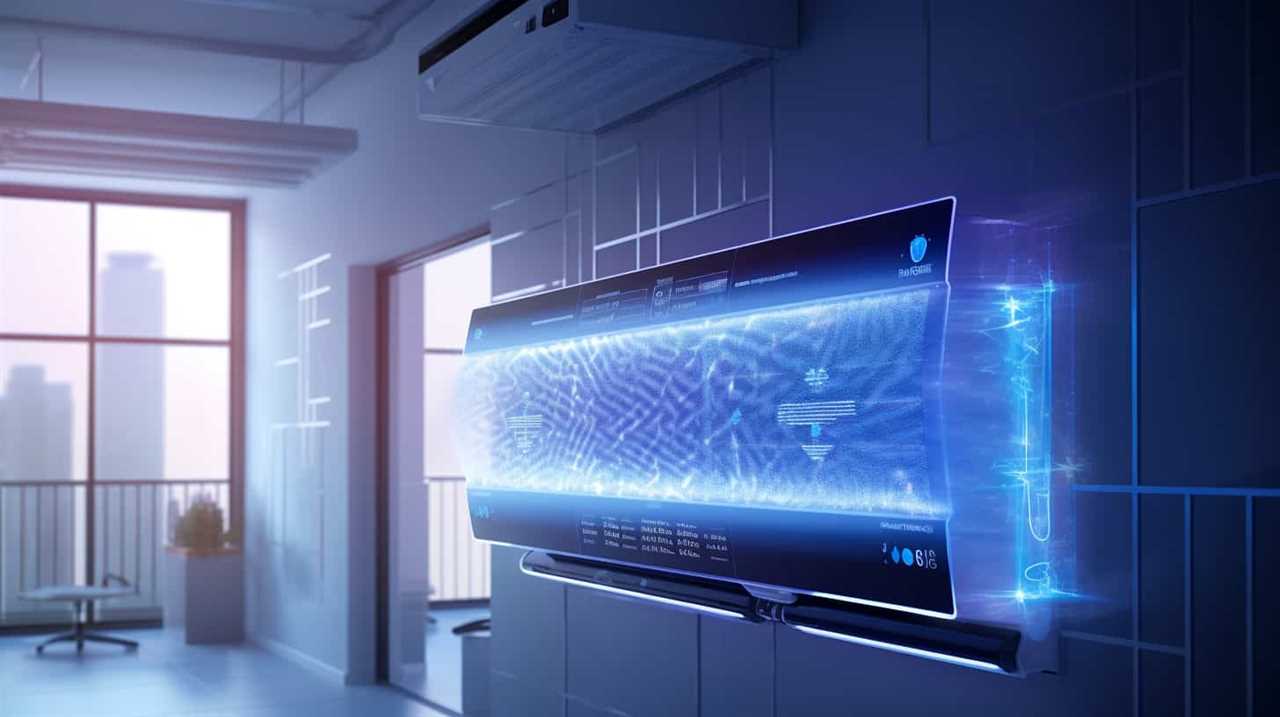
Conclusion
In conclusion, understanding the key factors that affect heat pump energy efficiency ratings is crucial for maximizing the performance of these systems.
By considering factors such as SEER and HSPF ratings, as well as choosing the right size heat pump and maintaining it properly, homeowners can ensure optimal energy efficiency.
Remember, the quest for efficiency isn’t merely a choice, but a necessity for a greener and more sustainable future.
